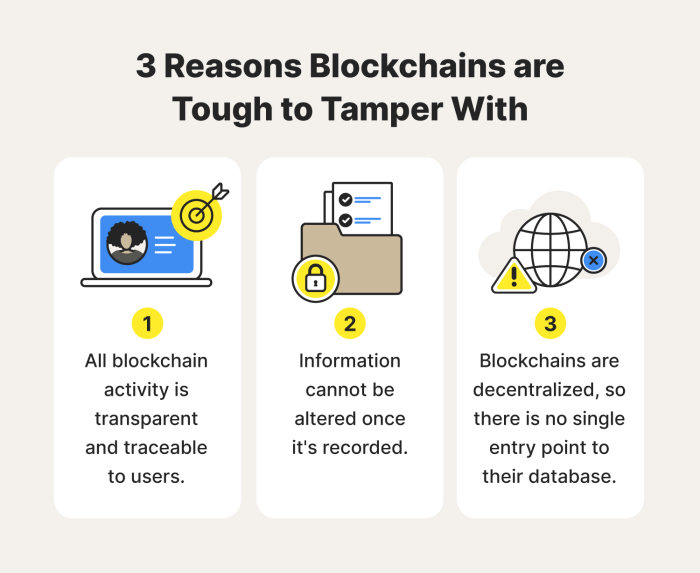How Blockchain Technology Can Improve Security sets the stage for a deep dive into the world of data protection, offering a fresh perspective that’s both informative and engaging.
Exploring the nuances of blockchain technology and its pivotal role in ensuring secure transactions and data integrity, this topic delves into the cutting-edge solutions reshaping our digital landscape.
Overview of Blockchain Technology for Security

Blockchain technology is a decentralized and distributed ledger system that securely records transactions across a network of computers. It ensures security through its core principles of decentralization, transparency, and immutability.
Decentralization
- Blockchain operates on a peer-to-peer network where transactions are verified by multiple nodes, eliminating the need for a central authority.
- This decentralized approach makes it extremely difficult for hackers to manipulate the system, as they would need to compromise a majority of the network to alter any transaction data.
- Decentralization also ensures that there is no single point of failure, reducing the risk of cyber attacks and enhancing security.
Cryptography
- Cryptography plays a crucial role in securing blockchain transactions by encrypting data and creating digital signatures.
- Each transaction is verified using complex mathematical algorithms, making it virtually impossible for unauthorized parties to tamper with the data.
- Public and private keys are used to authenticate users and ensure that only authorized individuals can access and validate transactions on the blockchain.
Applications of Blockchain in Security: How Blockchain Technology Can Improve Security

Blockchain technology has revolutionized the way data is secured across various industries. By leveraging its decentralized and immutable nature, blockchain offers enhanced security measures that traditional methods struggle to match. Let’s explore how blockchain can improve data security in industries like finance, healthcare, and supply chain.
Finance Industry
- Blockchain technology is used in the finance industry to secure transactions, prevent fraud, and streamline processes.
- Smart contracts on the blockchain ensure transparent and tamper-proof agreements between parties.
- Examples include cross-border payments, identity verification, and asset tokenization.
Healthcare Industry, How Blockchain Technology Can Improve Security
- Blockchain secures patient data, ensuring privacy and integrity of medical records.
- It enables interoperability between healthcare providers, improving data sharing and patient care.
- Use cases include drug traceability, clinical trials management, and telemedicine services.
Supply Chain Industry
- Blockchain enhances transparency and traceability in the supply chain, reducing counterfeiting and improving product authenticity.
- By recording every step of the supply chain on the blockchain, companies can verify the origin and quality of products.
- Examples include food safety tracking, luxury goods authentication, and ethical sourcing verification.
Blockchain offers a secure and efficient way to protect data, prevent unauthorized access, and ensure trust among parties.
Enhancing Data Integrity and Transparency
Blockchain technology plays a vital role in enhancing data integrity and transparency, which are crucial aspects of security in various applications. By utilizing blockchain, organizations can ensure the trustworthiness of their data and promote transparency throughout their operations.
Data Integrity Through Immutability
Blockchain technology ensures data integrity through the concept of immutability. Once data is recorded on a block and added to the chain, it cannot be altered or deleted without consensus from the network participants. This feature prevents unauthorized modifications to the data, maintaining its integrity and reliability.
- Transactions recorded on a blockchain are irreversible, making it impossible to tamper with historical data.
- The cryptographic hash function used in blockchain technology helps in validating the integrity of the data stored in each block.
- Immutability of data in blockchain provides a secure and tamper-proof environment for sensitive information.
Transparency Features of Blockchain
Blockchain technology offers transparency by providing a shared and decentralized ledger accessible to all network participants. This transparency promotes accountability and trust among users, as they can verify the data stored on the blockchain in real-time.
- Every transaction recorded on the blockchain is visible to all participants, ensuring transparency in the system.
- Smart contracts on blockchain platforms enable automated processes based on predefined rules, enhancing transparency in business operations.
- Blockchain’s public nature allows for easy auditing of transactions and data, reducing the risk of fraud or manipulation.
Smart Contracts and Secure Transactions

Smart contracts are self-executing contracts with the terms of the agreement directly written into lines of code. These contracts are stored on a blockchain network, ensuring security and transparency in transactions.
Role of Smart Contracts in Enhancing Security
Smart contracts play a crucial role in enhancing security by eliminating the need for intermediaries, reducing the risk of fraud, and ensuring that agreements are automatically enforced once the conditions are met. This removes any ambiguity or potential for manipulation in transactions.
How Blockchain Enables Secure and Automated Transactions through Smart Contracts
Blockchain technology provides a decentralized and immutable ledger where smart contracts can be executed. The distributed nature of blockchain ensures that all transactions are recorded and verified by multiple nodes, making it extremely difficult for any single entity to manipulate the process. Smart contracts automate the execution of transactions once predefined conditions are met, reducing the risk of human error and ensuring trust in the process.
Benefits of Using Smart Contracts for Secure Transactions
– Increased Security: Smart contracts reduce the risk of fraud and manipulation by automating the execution of transactions based on predefined rules.
– Efficiency: Transactions are processed automatically once conditions are met, eliminating the need for manual intervention and reducing processing times.
– Cost-Effective: By removing intermediaries from the process, smart contracts reduce transaction costs and overhead expenses.
– Transparency: All transactions recorded on the blockchain are transparent and immutable, providing a clear audit trail of activities.


